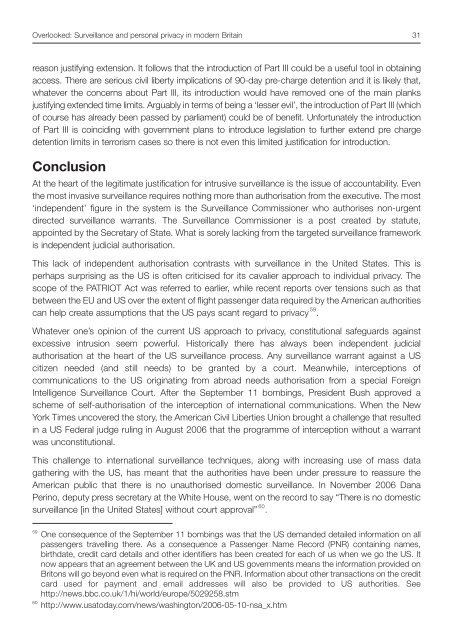Overlooked - Liberty
Overlooked - Liberty
Overlooked - Liberty
Create successful ePaper yourself
Turn your PDF publications into a flip-book with our unique Google optimized e-Paper software.
<strong>Overlooked</strong>: Surveillance and personal privacy in modern Britain 31<br />
reason justifying extension. It follows that the introduction of Part III could be a useful tool in obtaining<br />
access. There are serious civil liberty implications of 90-day pre-charge detention and it is likely that,<br />
whatever the concerns about Part III, its introduction would have removed one of the main planks<br />
justifying extended time limits. Arguably in terms of being a ‘lesser evil’, the introduction of Part III (which<br />
of course has already been passed by parliament) could be of benefit. Unfortunately the introduction<br />
of Part III is coinciding with government plans to introduce legislation to further extend pre charge<br />
detention limits in terrorism cases so there is not even this limited justification for introduction.<br />
Conclusion<br />
At the heart of the legitimate justification for intrusive surveillance is the issue of accountability. Even<br />
the most invasive surveillance requires nothing more than authorisation from the executive. The most<br />
‘independent’ figure in the system is the Surveillance Commissioner who authorises non-urgent<br />
directed surveillance warrants. The Surveillance Commissioner is a post created by statute,<br />
appointed by the Secretary of State. What is sorely lacking from the targeted surveillance framework<br />
is independent judicial authorisation.<br />
This lack of independent authorisation contrasts with surveillance in the United States. This is<br />
perhaps surprising as the US is often criticised for its cavalier approach to individual privacy. The<br />
scope of the PATRIOT Act was referred to earlier, while recent reports over tensions such as that<br />
between the EU and US over the extent of flight passenger data required by the American authorities<br />
can help create assumptions that the US pays scant regard to privacy 59 .<br />
Whatever one’s opinion of the current US approach to privacy, constitutional safeguards against<br />
excessive intrusion seem powerful. Historically there has always been independent judicial<br />
authorisation at the heart of the US surveillance process. Any surveillance warrant against a US<br />
citizen needed (and still needs) to be granted by a court. Meanwhile, interceptions of<br />
communications to the US originating from abroad needs authorisation from a special Foreign<br />
Intelligence Surveillance Court. After the September 11 bombings, President Bush approved a<br />
scheme of self-authorisation of the interception of international communications. When the New<br />
York Times uncovered the story, the American Civil Liberties Union brought a challenge that resulted<br />
in a US Federal judge ruling in August 2006 that the programme of interception without a warrant<br />
was unconstitutional.<br />
This challenge to international surveillance techniques, along with increasing use of mass data<br />
gathering with the US, has meant that the authorities have been under pressure to reassure the<br />
American public that there is no unauthorised domestic surveillance. In November 2006 Dana<br />
Perino, deputy press secretary at the White House, went on the record to say “There is no domestic<br />
surveillance [in the United States] without court approval” 60 .<br />
59<br />
One consequence of the September 11 bombings was that the US demanded detailed information on all<br />
passengers travelling there. As a consequence a Passenger Name Record (PNR) containing names,<br />
birthdate, credit card details and other identifiers has been created for each of us when we go the US. It<br />
now appears that an agreement between the UK and US governments means the information provided on<br />
Britons will go beyond even what is required on the PNR. Information about other transactions on the credit<br />
card used for payment and email addresses will also be provided to US authorities. See<br />
http://news.bbc.co.uk/1/hi/world/europe/5029258.stm<br />
60<br />
http://www.usatoday.com/news/washington/2006-05-10-nsa_x.htm















